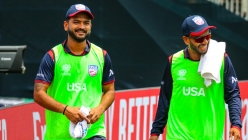Instant cricket meets instant verdict
2009 Oct 05 by Suresh Menon
Are our television commentators excessively harsh? Television commentators rush to judgment all too quickly Ã? perhaps that is the nature of the medium, where instant cricket meets instant verdict. And suddenly everybody from the chaiwallah to the politician is talking about a playerrrÃ?s struggle and offering opinions culled from the commentary.
Just how much introspection will Mahendra Singh Dhoni and his men be able to put in before the wheel turns again? And another tournament, another opponent, another set of possibilities bury the failures at the Champions Trophy? One advantage of playing continuously is that setbacks are quickly forgotten for there is always something around the corner – victory or defeat – to get exercised over.
Introspection is left to those who get paid for it, and that is why it is the coaches and trainers who pay for a team’s poor performances. It might be unfair to write off the Indian team after one tournament. Skipper Dhoni himself appeared a bit confused – after all, India lost one match, another was washed out, and they won one, so mathematically it wasn’t so bad. But top teams don’t look for excuses, they go out and rectify their problems.
And India’s problems are basically two-fold. Disastrous fielding, and an over-friendly bowling where yesterday’s heroes suddenly look strangely innocuous. Poor Ishant Sharma has been copping much of the blame for the bowling performance. This is convenient criticism. One player who represents a pattern is made the scapegoat. If poor running between the wickets is a drawback, then there is Rahul Dravid – run out in two matches – who fits the bill. If shoddy batting in the middle order is being discussed, then it is Suresh Raina who personifies that.
But just how much has Ishant Sharma slipped in recent months? Is it fair to pick on him just as Irfan Pathan was not so long ago? Ishant is young, talented, and surely entitled to having the odd off day at the office?
Are our television commentators excessively harsh? Last week, Dave Richardson, the ICC’s cricket manager commenting on the plight of the umpires said that “The batsman is not out when the umpire says he is out. The batsman is out when Mark Nicholas or Tony Greig or Ian Chappell or Ravi Shastri says he is out.” Perhaps that applies to the players too. Television commentators rush to judgment all too quickly – perhaps that is the nature of the medium, where instant cricket meets instant verdict. And suddenly everybody from the chaiwallah to the politician is talking about a player’s struggle and offering opinions culled from the commentary.
I can think of at least one Indian batsman whose career ended prematurely because commentators kept harping on the fact that his feet were not moving properly. “Forget my feet, look at where the ball is finishing up,” he could have said, but didn’t.
So long as the bowler is trying his best, and has both age and agility in his favour, it is usually only a matter of time before he shakes off the occasional bad series and comes back full steam. The key phrase there is “trying his best”. And it is clear that some of India’s fielders are not trying their best. Whatever the format of the game, there can be no excuse for poor fielding.
Manoj Prabhakar has already called Venkatesh Prasad a bag handler rather than a bowling coach, and doubtless someone will soon say something similar about Robin Singh, the fielding coach. Gary Kirsten’s image has taken a beating over the sexual recommendations, so this core group will have to introspect just as keenly as the players who disappointed in South Africa. In two major ICC tournaments of the year, the Twenty20 World Cup being the other one, India failed to live up to potential. They were front runners to win both titles.
But should an Indian team win the Champions League Twenty20, who will remember all this?




